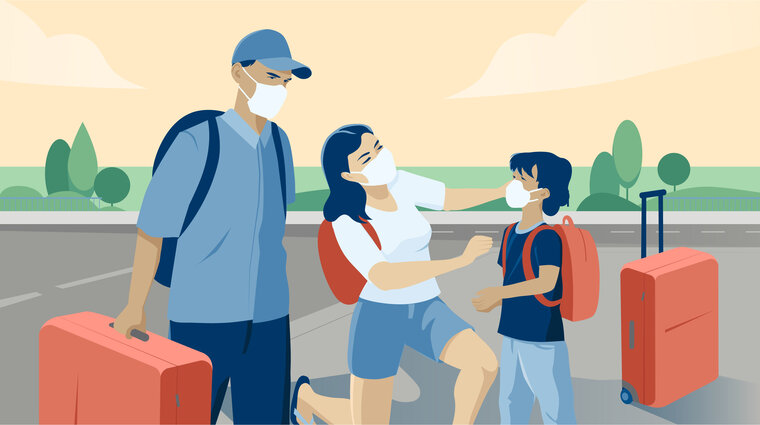This summer was one that many holiday travellers in Europe will not forget. Since the end of February, the coronavirus crisis has seriously disrupted many vacation plans. According to a survey conducted by Customer Research 42 GmbH on behalf of the Erwin Hymer Group, 51% of all respondents had to change their vacation plans due to the Covid-19 pandemic. Around 50% of all respondents spent their summer vacations at home – almost 70% more than in the previous year. Among the “active” forms of travel, only vacations with caravans or motorhomes recorded growth. Around 13% of Europeans who went on a trip during their vacations spent their summer leave at a campsite in 2020. Flight package tours (down 69%) and cruises (down 42%) showed the sharpest declines compared with 2019.
For Martin Brandt, CEO of the Erwin Hymer Group, this is not a surprising result: “In a home on wheels, social distancing is easier than with other forms of travel and vacation. The demand for our products is growing and we assume that this year, the RV season will extend into the cold season.”
Caravanning as a popular alternative to the usual vacation
Even if a summer vacation on the balcony or terrace was the most frequent vacation form this year, many travellers nevertheless went long-distance, although their trips were not quite as planned or anything like last’s year’s vacations. For many, caravanning was the alternative: around half of the vacationers who were on the road this year with a caravan or motorhome were new to this form of travel. 18% of this year's caravanning vacationers had booked a flight package tour in 2019; 16% had spent their vacation in a hotel, guesthouse or apartment. “We were able to benefit from the sudden reorientation in vacation planning. The stock vehicles of our dealers were in great demand in spring and our rental companies saw a sharp rise in short-term booking requests at the beginning of the season,” said Brandt.
According to the Europe-wide survey, there were five main reasons for not taking the previous type of vacation and for switching to a caravanning trip: 80% did not want to travel by plane because of the coronavirus, 75% were concerned that they would not be able to return on schedule. Other important factors were the fear of having to go into quarantine, the coronavirus-related requirements that would affect the previous form of vacation (70% in each case) and the risk of infection (66%).
“The figures show us the uncertainty of holidaymakers and the fear of contagion,” explained Brandt. “This confirms our decision not to attend trade fairs this year in order to protect our customers, employees and partners. Thanks to our widespread dealer network, customers can instead view our products decentralised at their local dealer or obtain information via the digital channels.”
Ideal vacation form in the crisis
Conversely, the reasons that speak in favour of caravanning according to the survey show why this form of vacation is so attractive, especially in the current crisis: participants named the possibility of travelling to different places (52%), the independence of self-determined travel (51%), and closeness to nature (47%). Other important reasons are the preference for individual rather than mass tourism and the opportunity to try something new (40%). The low risk of infection also plays a role: 30% of those surveyed see this as an argument in favour of a caravanning vacation – just as many as expect caravanning to be an effective way to decelerate from stressful everyday life. Overall, the attitude towards the mobile form of vacation is extremely positive: a total of 43% of all respondents across Europe can imagine spending a caravanning vacation within the next three years.
Decelerated travel – preferably close to home
Not only the form of travel, but also the choice of vacation destinations is being influenced by the coronavirus – the radius is becoming smaller: holidaymakers who travelled outside Europe in 2019 are more likely to spend their vacations in another European country in 2020 (19%). Those who previously travelled to other European countries now go on vacation in their own country (23%) - and those who travelled in Germany in 2019 but outside their own region prefer to stay close to home this year (17%). “Many are rediscovering the beauty of their own country and region this year,” said Brandt, summing up the results: “Conscious and decelerated travel is on the upswing.”
About the Erwin Hymer Group
The Erwin Hymer Group is a 100 percent subsidiary of THOR Industries, the world’s leading manufacturer of recreational vehicles with just over 20,900 employees worldwide. The Erwin Hymer Group unites motorhome and caravan manufacturers as well as motorhome and caravan accessory specialists, hire and financing services under one roof. The motorhome and caravan brands Buccaneer, Bürstner, Carado, Corigon, Crosscamp, Dethleffs, Elddis, Eriba, Etrusco, Hymer, Laika, LMC, Niesmann+Bischoff, Sunlight and Xplore, the rental companies Crossrent, McRent and rent easy, the chassis specialist Goldschmitt, the accessories specialist Movera and the touring portal Freeontour all belong to the Erwin Hymer Group.
Further information is provided at www.erwinhymergroup.com.
Press contact
Stefan von Terzi
Corporate Communications
Erwin Hymer Group SE
Holzstr. 19
88339 Bad Waldsee
Germany

